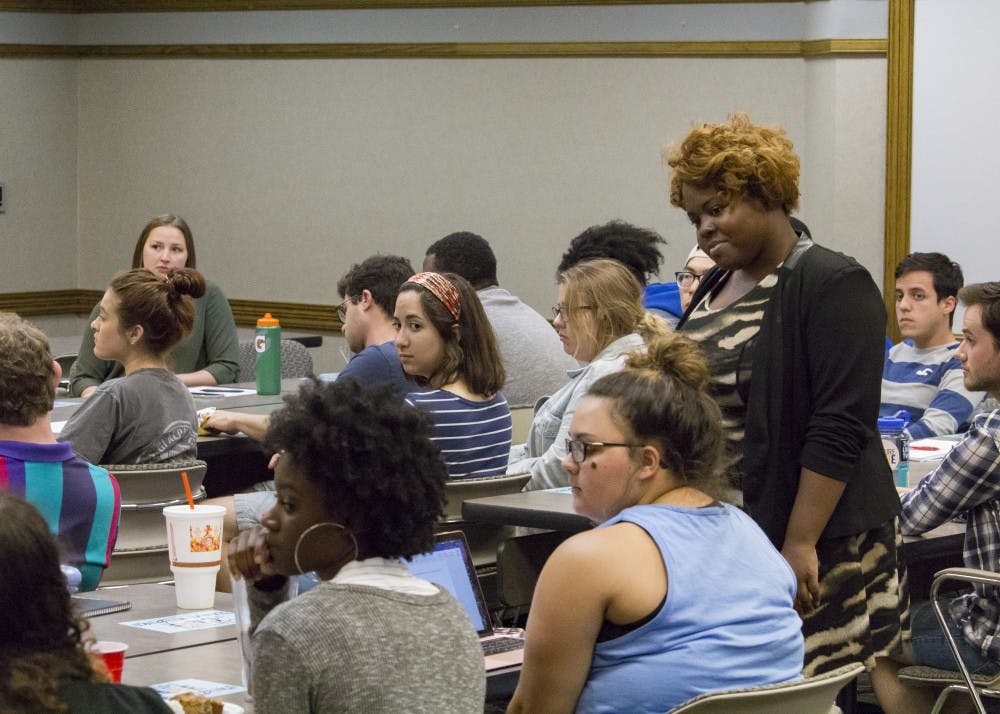Sophomore Lilly Forkner said the stigma behind reporting sexual violence might be perpetuated by a historic lack of inaction.
“If I’ve been sexually assaulted, and I go to the police, will I just be another statistic?” Forkner asked.
Culture of Care and IU’s Office of Sexual Violence Prevention and Victim Advocacy organized a summit called #MeToo at IU on Thursday evening in the Indiana Memorial Union Dogwood Room to discuss how the University handles sexual misconduct.
As the #MeToo movement has brought sexual misconduct to the forefront of national media, incidences on campus have come under increased scrutiny.
Since 2014, IU has been subject to five federal investigations of its sexual misconduct practices. Those were cleared in February alongside a formal agreement between IU and the Department of Education creating two committees to study the University’s sexual misconduct responses.
IU had 164 reports of sexual misconduct during the 2016-17 academic year, according to an Office of Student Welfare and Title IX report released in early February.
After panelists from key administrative offices relating to sexual misconduct shared current policies, students analyzed ways the University could improve its programs and responses.
“There are a lot of things that we have had the opportunity to change because students have been brave enough to let us know,” said Libby Spotts, Director of Student Conduct for the Office of Student Conduct.
The Office for Sexual Violence Prevention and Victim Advocacy approached Culture of Care about using the fourth day of this year’s Culture of Care week to receive feedback from a new generation of students.
Culture of Care week is the organization’s biggest event of the year, according to sophomore Ibby Ahmed, Sexual Well-being committee co-chair. Tabling and activities throughout the weak aim to foster awareness and discussion about its four focus areas of respect, mental health, drugs and alcohol and sexual well-being.
“The whole week is all about learning,” Ahmed said. “These are topics that you don’t really learn in school.”
Sally Thomas, senior assistant director of victim resources for the Office for Sexual Violence Prevention and Victim Advocacy, said the Confidential Victim Advocates program addresses student safety, academic challenges associated with experiencing trauma and steps to reporting sexual misconduct.
As a confidential employee, Thomas said students can come to her office as a first resource before making a decision on whether to formally share their experience.
Spotts, whose work is not confidential, emphasized reported cases are handled individually, depending on the reporting student’s circumstances and wishes.
“There’s no better or worse way to do it,” Spotts said.
Leslie Fasone, director of the Office of Sexual Violence Prevention and Victim Advocacy, shared the office’s recent undertakings to make resources and information more accessible to students.
After hearing the University’s current programs and policies, students broke into facilitated small group discussions to brainstorm ways the University could improve.
Ahmed and her Sexual Well-being committe co-chair, junior Ryan Arick, will compile these to present a formal list to administrators.
Arick and Ahmed said they contacted almost 40 student organizations about partnering for the summit in order to generate suggestions reflective of the needs and desires of the University’s diverse population.
“So it’s not just one story,” Ahmed said. “It’s everyone’s story.”
Among individual students, representatives attended from IUB Crimson Corps, IU Student Association, Raising Awareness of Interactions in Sexual Encounters at IU, Black Student Union-IU, International Student Ambassadors, IU Feminist Association, IU Panhellenic Association, National Panhellenic Council, Safe Sisters IU, and IU Graduate and Professional Student Government Diversity.
To make resources more accessible, freshman Jacob Lampf said the University might make the IU Health Center a stop on campus tours.
He also suggested the University provide more student-to-student presentations, like the musical at new student orientation, to make advice more relatable.
Students also brought up the need to extend sexual misconduct resources to minority populations.
Arick noted language barriers and culture changes can often impede international students’ understanding of the University’s informative materials like the bathroom signs .
Fasone said the Office of Sexual Violence Prevention and Victim Advocacy is developing an online program to help international students understand American culture and slang, such as explaining what “Netflix and Chill” means.
Senior Caro Oates said she wants to see the University specify ways transgender communities might experience sexual assault, which manifests differently than for a heterosexual white woman.
“Wealthy white women feel a very different kind of support than a queer kid who’s also on DACA,” Oates said.
She said people should be having intentional conversations about how racism informs instances of sexual misconduct.
“The only way I can see us building a better world is to start at the most marginalized folks,” Oates said.
After spending two years on campus, Ahmed said she has seen sexual assault not only at parties, but also through Tinder. Ahmed said she would like to see IU address online harassment.
“It’s still student-to-student,” Ahmed said. “It’s still happening on your campus, and it’s affecting students who live here.”
Ahmed joined the Culture of Care Sexual Well-being committee for the chance to affect change.
“It’s not just for one demographic,” Ahmed said. “It happens to everyone.”
A previous version of this article misspelled Lilly Forkner's last name in a quote attribution. The IDS regrets this error.




